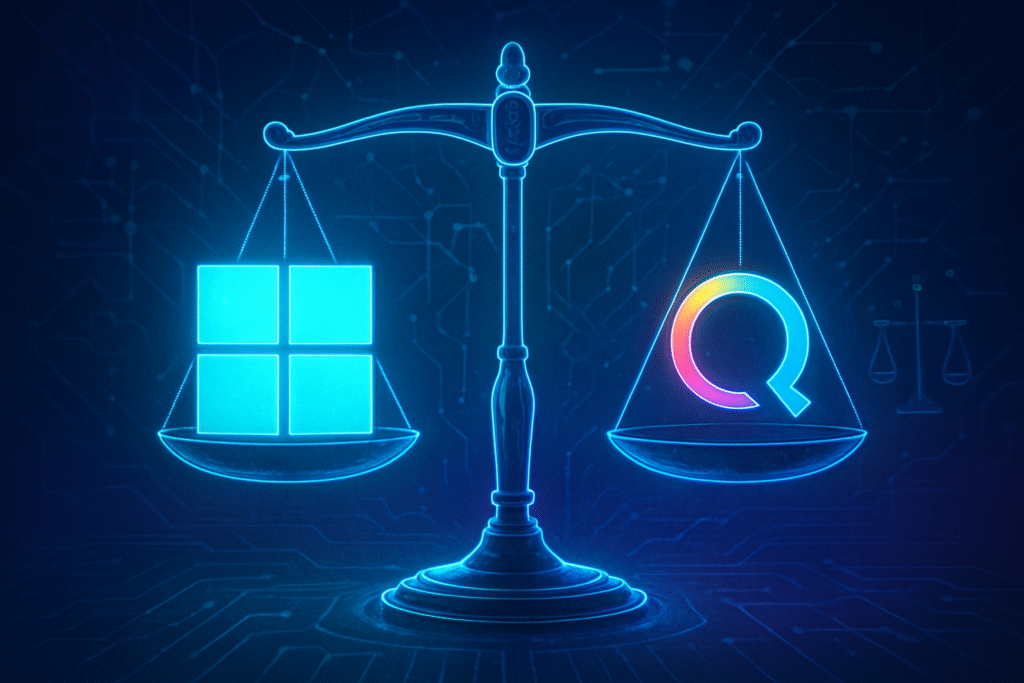
Paris, France – November 28, 2025 – In a move that underscores the persistent challenges faced by smaller tech innovators against industry behemoths, France's competition watchdog, the Autorité de la concurrence, has dismissed an antitrust complaint filed by French search engine Qwant against tech giant Microsoft (NASDAQ: MSFT). The decision, handed down on November 27, 2025, marks a significant moment for European antitrust enforcement and raises critical questions about the effectiveness of current regulations in fostering fair competition within the rapidly evolving digital landscape.
The dismissal comes as a blow to Qwant, which has long positioned itself as a privacy-focused alternative to dominant search engines, and highlights the difficulties in proving anti-competitive practices against companies with vast market power. The ruling is expected to be closely scrutinized by other European regulators and tech startups, as it sets a precedent for how allegations of abuse of dominant position and restrictive commercial practices in the digital sector are evaluated.
The Unraveling of a Complaint: Allegations and the Authority's Verdict
Qwant's complaint against Microsoft centered on allegations of several anti-competitive practices primarily related to Microsoft's Bing search engine syndication services. Qwant, which previously relied on Bing's technology to power parts of its search and news results, accused Microsoft of leveraging its market position to stifle competition. The core of Qwant's claims included:
- Imposing Exclusivity Restrictions: Qwant alleged that Microsoft imposed restrictive conditions within its syndication agreements, limiting Qwant's ability to develop its own independent search engine technology, expand its advertising network, and advance its artificial intelligence capabilities. This, Qwant argued, created an unfair dependency.
- Preferential Treatment for Microsoft's Own Services: The French search engine contended that Microsoft systematically favored its own services when allocating search advertising through the Bing syndication network, thereby disadvantaging smaller European providers and hindering their growth.
- Abuse of Dominant Position and Economic Dependence: Qwant asserted that Microsoft abused its dominant position in the search syndication market and exploited Qwant's economic dependence on its services, hindering fair market access and development.
- Exclusive Supply Arrangements and Tying: Specifically, Qwant claimed that Microsoft engaged in "exclusive supply arrangements" and "tying," forcing Qwant to use Microsoft's search results and advertising tools in conjunction, rather than allowing for independent selection and integration of other services.
However, the Autorité de la concurrence ultimately found these allegations to be insufficiently substantiated. The French regulator dismissed the complaint for several key reasons. Crucially, the authority concluded that Qwant failed to provide "convincing or sufficient evidence" to support its claims of anti-competitive conduct and abusive behavior by Microsoft. The regulator found no adequate proof regarding the alleged exclusivity restrictions or preferential advertising treatment. Furthermore, the Autorité de la concurrence determined that Qwant did not successfully demonstrate that Microsoft held a dominant position in the relevant search syndication market or that Qwant lacked viable alternative services, especially noting Qwant's recent partnership with another search engine to launch a new syndication service using its own technology. Consequently, the watchdog also declined to impose the urgent interim measures against Microsoft that Qwant had requested.
Competitive Implications: A Setback for Smaller Players
The dismissal of Qwant's antitrust case against Microsoft carries significant competitive implications, particularly for smaller tech companies and startups striving to compete in markets dominated by tech giants. For Qwant, this decision represents a substantial setback. The French search engine, which has championed privacy and data protection as its core differentiator, aimed to use the antitrust complaint to level the playing field and foster greater independence from larger technology providers. Without a favorable ruling, Qwant and similar challengers may find it even more arduous to break free from the gravitational pull of established ecosystems and develop proprietary technologies without facing perceived restrictive practices.
Microsoft (NASDAQ: MSFT), conversely, emerges from this ruling with its existing business practices seemingly validated by the French regulator. This decision could embolden Microsoft and other major tech companies to continue their current strategies regarding search syndication and partnership agreements, potentially reinforcing their market positioning. The ruling might be interpreted as a green light for dominant players to maintain or even expand existing contractual frameworks, making it harder for nascent competitors to gain traction. This outcome could intensify the competitive pressures on alternative search engines and other digital service providers, as the cost and complexity of challenging tech giants in court remain exceptionally high, often outweighing the resources of smaller entities. The decision also highlights the ongoing debate about what constitutes "dominant position" and "anti-competitive behavior" in fast-evolving digital markets, where innovation and rapid market shifts can complicate traditional antitrust analyses.
Broader Significance: Antitrust in the Digital Age
This decision by the Autorité de la concurrence resonates far beyond the specific dispute between Qwant and Microsoft, touching upon the broader landscape of antitrust regulation in the digital age. It underscores the immense challenges faced by competition watchdogs globally in effectively scrutinizing and, when necessary, curbing the power of technology giants. The digital economy's characteristics—network effects, data advantages, and rapid innovation cycles—often make it difficult to apply traditional antitrust frameworks designed for industrial-era markets. Regulators are frequently tasked with interpreting complex technological agreements and market dynamics, requiring deep technical understanding alongside legal expertise.
The Qwant case highlights a recurring theme in antitrust enforcement: the difficulty for smaller players to gather sufficient, irrefutable evidence against well-resourced incumbents. Critics often argue that the burden of proof placed on complainants can be prohibitively high, especially when dealing with opaque contractual agreements and rapidly changing digital services. This situation can create a chilling effect, deterring other potential complainants from pursuing similar cases. The ruling also stands in contrast to other ongoing antitrust efforts in Europe and elsewhere, where regulators are increasingly taking a tougher stance on tech giants, evidenced by landmark fines and new legislative initiatives like the Digital Markets Act (DMA). The Autorité de la concurrence's dismissal, therefore, provides a point of divergence and invites further discussion on the consistency and efficacy of antitrust enforcement across different jurisdictions and specific case merits. It also re-emphasizes the ongoing debate about whether existing antitrust tools are adequate to address the unique challenges posed by platform economies and digital ecosystems.
Future Developments: A Long Road Ahead
The dismissal of Qwant's complaint does not necessarily signal the end of the road for antitrust scrutiny in the tech sector, though it certainly presents a hurdle for similar cases. In the near term, Qwant could explore options for an appeal, although the likelihood of success would depend on new evidence or a different interpretation of existing facts. More broadly, this case is likely to fuel continued discussions among policymakers and legal experts about strengthening antitrust frameworks to better address the nuances of digital markets. There is a growing push for ex-ante regulations, such as the EU's Digital Markets Act, which aim to prevent anti-competitive behavior before it occurs, rather than relying solely on lengthy and often unsuccessful ex-post investigations.
Experts predict that the focus will increasingly shift towards these proactive regulatory measures and potentially more aggressive enforcement by national and supranational bodies. The challenges that Qwant faced in demonstrating Microsoft's dominant position and anti-competitive conduct may prompt regulators to reconsider how market power is defined and proven in highly dynamic digital sectors. Future applications and use cases on the horizon include the development of new legal precedents based on novel theories of harm specific to AI and platform economies. The core challenge that needs to be addressed remains the imbalance of power and resources between tech giants and smaller innovators, and how regulatory bodies can effectively intervene to foster genuine competition and innovation.
Comprehensive Wrap-Up: A Call for Evolved Antitrust
The dismissal of Qwant's antitrust complaint against Microsoft by the Autorité de la concurrence is a significant development, underscoring the formidable barriers smaller companies face when challenging the market power of tech giants. The key takeaway is the high bar for proving anti-competitive behavior, particularly regarding dominant positions and restrictive practices in complex digital ecosystems. This outcome highlights the ongoing debate about the adequacy of current antitrust regulations in addressing the unique dynamics of the digital economy.
While a setback for Qwant and potentially other aspiring competitors, this event serves as a crucial case study for regulators worldwide. Its significance in AI history, though indirect, lies in its implications for competition in the underlying infrastructure that powers AI development—search, data, and advertising networks. If smaller players cannot compete effectively in these foundational areas, the diversity and innovation within the broader AI landscape could be constrained. Moving forward, observers will be watching to see if this decision prompts Qwant to pivot its strategy, or if it galvanizes policymakers to further refine and strengthen antitrust laws to create a more equitable playing field. The long-term impact will depend on whether this ruling is an isolated incident or if it signals a broader trend in how digital antitrust cases are adjudicated, potentially influencing the very structure of competition and innovation in the tech sector for years to come.
This content is intended for informational purposes only and represents analysis of current AI developments.
TokenRing AI delivers enterprise-grade solutions for multi-agent AI workflow orchestration, AI-powered development tools, and seamless remote collaboration platforms.
For more information, visit https://www.tokenring.ai/.




